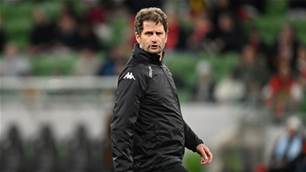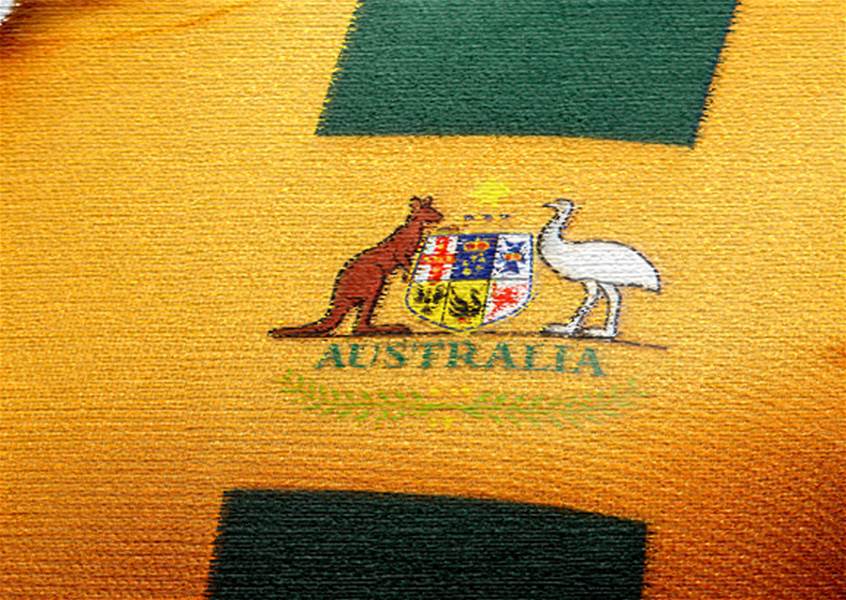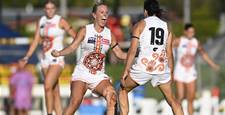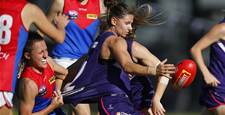The transition for the national team to a new coach, any new coach, was always going to be challenging after more than eight years under Tom Sermanni’s management.
The transition for the national team to a new coach, any new coach, was always going to be challenging after more than eight years under Tom Sermanni’s management.
It's hard to believe that 15 months from his departure the Matildas would be reeling to this extent.
With the team's ranking and morale low, Professional Footballers Australia (PFA) and senior Football Federation Australia (FFA) have been contacted to intervene.
How did it get to this stage without intervention and what happens next?
What is increasingly clear is that this is a situation that has been bubbling away for many months. The Women's Game have interviewed a number of players (ex and current who have not been named), the PFA and others close to the situation to try and determine the timeline of events and the next steps.
The timeline
It's well know that Sermanni’s approach to management was to be open, focused on personal accountability with the staff and the players having a say in the team discipline and culture.
Towards the end of his tenure it was also one of the criticisms with a feeling that the players had too much of a say and questions raised about team discipline, particularly relating to new and younger players.
In almost all ways, Hesterine de Reus is the opposite of Sermanni but initially her entry into the set up was met positively. In the first training camps of 2013, players praised the increased intensity of sessions and increased professionalism.
Then it gradually began to change.
The first whispers of discontent began in April 2013, although at that time it related to matters of a minor nature with the players raising their concerns with Matildas’ staff and de Reus herself.
The first significant breakdown came in May and concerned changes to the Collective Bargaining Agreement (the CBA) and the wage structure.
The previous CBA saw 23 players contracted for 12 months and remunerated in a three-tiered system with the head coach assigning players to a tier based on their performance. This structure saw the top tier of players earning a base of $33,000 plus match payments.
The agreed new system was to see all 24 contracted players paid an equal base salary with match fees acting as an incentive for performance. The new contracts were also shortened to a term of six months.
“We collectively agreed that we would all be on the same base wages," said an established player. "At the end whoever plays the most minutes earns the reward of an extra salary by match payments.”
While it is acknowledged that de Reus has discretion in relation to wages, the manner in which it was handle led to the first loss of faith.
Problems arose when it was revealed that the leadership group and other nominated players were paid outside of this wage structure without the knowledge of the majority of the playing group.
“If she had told players about it we it have been okay. We had a reward structure before but it was the way she went about it that started to strip away the trust.”
The preferential treatment of a small number players was a pattern to follow in the upcoming months causing further fissures.
June brought the first murmurings in relation to player selection and match play where charges of inconsistency in selection policy were laid.
One alleged example saw a couple of players not selected due to a recognised lack of match fitness while other players in the same situation were selected. In latter camps, some players would be selected according to form in the W-League while for others that same form would be considered irrelevant.
In late June Australia managed to maintain their unbeaten streak against New Zealand but the in-cohesive performance started the first questions.
The European tour in June/July saw further fractions occur in the relationship between coach and players with the effects of the tighter regime starting to show on the park.
Australia lost their first two matches to the Netherlands and to Dutch club side Ado den Haag before registering an unlikely result against France. Outplayed in all three matches, the tour was saved by strong individual performances of the goalkeepers and Katrina Gorry in particular.
Within the Australian women’s football community there was friction from the Young Matildas player availability disagreement, which ended up settled by senior FFA management, to differences with W-League coaches.
By the time October came around the whispers had gotten louder and with the situation not helped by Australia losing heavily to the United States 4-0.
“The US tour was a mess. The atmosphere had become so bad, so toxic that everyone couldn’t wait to come home.”
The November series against China saw some improvements on the pitch with the Matildas winning the series 2-0. Despite playing their best match under de Reus in a 2-0 win, off the pitch things continued to decline.
It's alleged that movements were further curtailed, team meetings had become adversarial and once again these concerns raised by some players and staff were either not addressed or simply ignored.
“The inconsistencies and mind games left even some of us who have been around a bit unsure of where we stood."
“Anyone who asked questions or didn't toe the line was out."
“The culture within the team changed completely and I had young players in tears regularly.”
The issues are not all consigned to the players with several long serving staff (male and female) leaving the set up either voluntarily or involuntarily.
Those that have remained have struggled, with several on the brink of resignation.
With more restrictions imposed on the squad after the February training camp, and more inconsistencies in player treatment, it all finally came to a head in March during the Cyprus Cup.
The tournament saw the Matildas finish seventh with only one win from their four games resulting in Australia's ranking fall to 11; their lowest since March 2011.
On that tour, all members of the squad attended a clandestine meeting at the conclusion of the Matildas loss to the Netherlands where the players settled on a course of action leading to them making formal contact with the PFA.
In defence of de Reus
It’s safe to say Hesterine de Reus’ introduction into the Australian women’s football system has caused big changes. Despite the recent media reports, the Dutchwoman does have supporters.
The main question raised in de Reus’ defence is how could the situation within the camp have deteriorated to this degree without the appropriate people within the FFA being notified.
From what The Women’s Game understands, while senior management were not notified, several people within the FFA were aware of issues although it has not been ascertained to what extent.
There has also been queries about whether this is a full playing squad resistance or the activities of a disgruntled minority, particularly as a number of players currently in the squad are new to the set up.
Again from what we understand the playing group are united in this course of action.
The situation also begs the question whether this is a case of a new and more authoritative player management style causing a “culture shock”.
“We have all had strict coaches in the past and some of us have strict coaches in the W-League but those coaches are always fair.”
“We know where we stand, the expectations are the same for everyone and there are no mind games or ultimatums.”
Formal PFA and FFA involvement
As has already been documented, last Wednesday the PFA met with a delegation of players to discuss the situation.
The result of that meeting is that a report has been compiled outlining alleged breaches of the CBA with the most serious, and it must be stressed that these are unproven allegations currently under investigation, relating to the bullying and intimidation of players and support staff.
“Professional Footballers Australia confirms it is in ongoing discussions with the Matildas regarding a number of significant issues,” said a spokesperson to The Women’s Game.
“As a result of these discussions, the PFA will submit a comprehensive report to FFA outlining a number of concerns.”
“These include compliance with the Collective Bargaining Agreement and players workplace health and safety.”
“The PFA will continue to work with the FFA throughout this process.”
The FFA, on the other hand, are currently undertaking a review into the national teams unit headed by FFA Head of National Performance Luke Casserly. Casserly, a former Socceroo, was in the Brisbane camp earlier in the week conducting interviews as part of the review.
“It’s been confirmed that these matters have also been referred by some players to Professional Footballers Australia,” an FFA spokesperson said to the Sydney Morning Herald.
“We are in discussions with the PFA and expect a formal report regarding their concerns.”
Where to now?
The PFA, as representatives of the players, and the FFA, as their employs, will look to resolve the issues identified in the PFA report.
If the parties cannot agree, then it moves to a formal grievance procedure that commences with an offer of mediation.
If mediation proves unsuccessful, then an independent arbitrator would be appointed. Although a sources within the PFA and FFA would be surprised if it process moves to the arbitration stage.
It is highly unlikely that any industrial relations type action (boycotting or striking) would occur as that would most likely result in the termination of players contracts.
The alternative is the termination of de Reus’ contract.
De Reus is currently contracted for a four year term. However, The Women’s Game has learned that there are periods for review of the contract according to benchmarks. One of those periods of review relates to the upcoming Asian Cup.
What can't be disputed is that this isn't ideal preparation for a highly anticipated series with world no. 6 Brazil and one month out from an Asian Cup defence.
How the situation is resolved and how the team continues from here remains to be seen.
Related Articles

'Timing not right': Montemurro's verdict on Matildas vacancy
.jpg&h=172&w=306&c=1&s=1)
Matildas star ready for epic return after 'really difficult' journey













